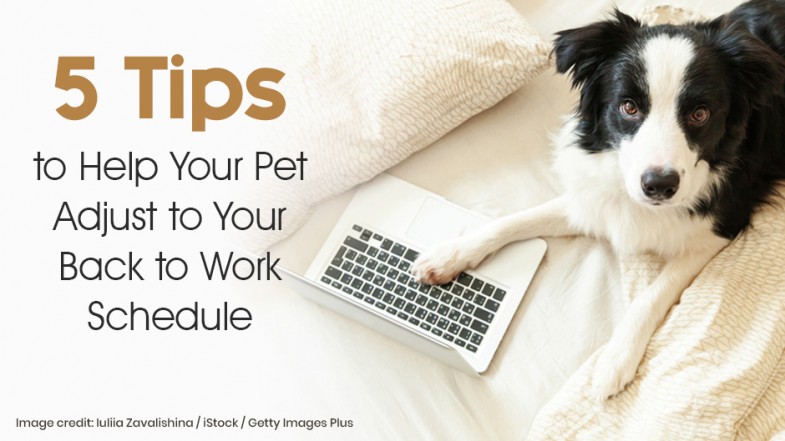Magnolia Veterinary Hospital News
5 Tips to Help Your Pet Adjust to Your Back to Work Schedule

It's back to work for many of us that were working from home. But what does it mean for our pets? Amidst the pandemic, our pets became accustomed to us being home for them nearly 24/7. This can make for a ruff transition for pets and their people, leading to increased cases of separation anxiety, behavior issues, and just general boredom for pets. We want to give you five tips on how to make the adjustment process easier.
1) Ease into the back-to-work transition
It will be very difficult for your pet if you are home all day one day, then abruptly change to being gone for eight or more hours per day. Gradual changes can help your pet adjust more smoothly.
Begin by leaving for short periods of time. Give your dog or cat a treat or special toy before you leave without a lot of fuss. When you return, don’t make a big deal of it. Rewarding your pet or greeting them too excitedly may make them more prone to separation anxiety or owner-return anticipation.
Consider the use of food puzzles or toys which enrich their minds. Crate training may also be beneficial to helping them feel calm and secure in your absence.
2) Exercise is good for the body and mind
Exercise and mental stimulation release positive endorphins in your pet’s brain. Exercise also helps your pet release any pent up energy.
Schedule play and exercise into your pet’s day, especially when you come home from work. Your cat will be happy to engage in a “Welcome home!” playdate. Consider an evening walk or game of fetch in the backyard before bedtime as well!
If you’re unable to get home mid-day for a quick break, consider hiring a dog-walker for a stroll around the neighborhood.
3) Consider taking your pet to work or doggy daycare
If your workplace policy permits bringing your pet to work, consider doing so. Of course, this means that your pet will need to be well-trained and not a disruption. If this just isn't a possibility, seek out doggy daycare opportunities. Socializing with other pets and people, as well as the consistent activity and exercise will help your pet focus on fun, and not the absence of you!
4) Be mindful of changes in your pet's behavior
Are you noticing changes in your pet's behavior such as destructiveness, soiling when previously trained, or trembling/shaking? It's time to come and see us. We can help walk you through changes that may help ease this transition and "new normal" for your pet's daily routine. In addition to modifications of behavior, we can suggest calming diffusers such as Adaptil (canine) or Feliway (feline) which are synthetic pheromones to help reduce anxiety.
5) Be mindful of your behaviors
Returning to work has brought about many complex emotions for people, too. Some of these include: getting back into a daily routine of preparing for traffic, adjusting to a faster pace in the morning routine, and even dealing with personal feelings on the safety of returning to work can cause our own human emotions to be less consistent than usual. Our pets are highly perceptive and will pick up on this. As complex as it may be, don't make leaving the house a highly emotional experience, and similarly, be calm and collected when returning (even if you are incredibly excited to see your pet after a long day of work!).
Your Pet Will Adjust to Your Work Schedule
Major changes often go smoothest when we can ease into the transition--the same is true for our pets. So, be mindful of how your pet reacts to your absence. If all goes well, both you and your pet will be enjoying your new routine, soon. If you notice changes in your pet's behavior that you need help addressing, please give us a call. We're here to help!
Categories
Recent Posts

If your dog won’t stop licking, chewing, or scratching one spot, it’s natural to wonder: “Is something wrong with my pet?” While occasional itching can be common, constant attention to a single area can signal a more serious issue, such as a hot spot. These inflamed patches of skin can appear almost overnight and quickly become painful and infected without treatment.
Let’s explore what hot spots are, what causes them, and how to help your dog heal quickly.

Sunshine, open windows, and the promise of new adventures—summer road trips are hard to resist. And if you’re like many pet parents, there’s no way you're leaving your four-legged friend behind. Whether you're headed to a cabin up north, the lake for the weekend, or on a cross-country tour, traveling with pets takes some extra planning. But with a little prep, your journey can be just as smooth for them as it is for you.
Before you gas up the car and grab the treats, here’s what you need to know to help your pet stay healthy, safe, and comfortable on the road.

Think heartworm is just a summertime issue? Or that your indoor cat is safe from it? You're not alone—many pet owners have heard (and believed) myths about heartworm disease. But the truth is, this serious and potentially deadly condition affects pets in every state and can impact even those who never leave the house.
Let’s clear up the confusion and give you the real facts about heartworm—so you can protect your furry family members with confidence.